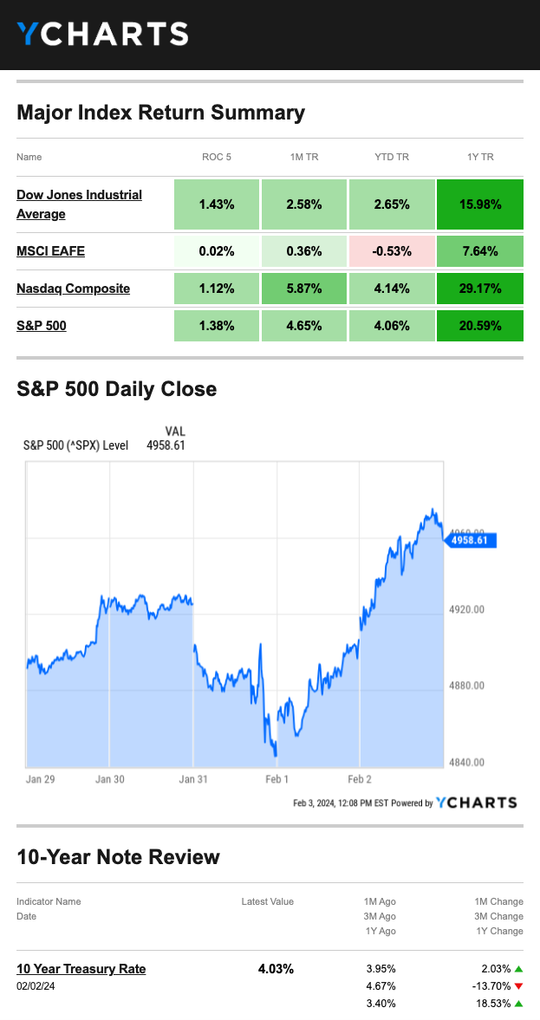Stocks pushed higher last week as investors cheered mega-cap tech corporate reports and a better-than-expected employment report.
Stocks at New Highs
At the beginning of the week, stocks surged, anticipating fourth-quarter corporate updates from tech companies and the Federal Reserve’s two-day policy meeting; this led to the S&P 500 Index reaching a new record high on Monday.
The market remained relatively stable for the rest of the week until Wednesday, when the Federal Reserve announced its decision to maintain interest rates within the 5.25-5.50 percent target range. The Federal Open Market Committee’s (FOMC) news unsettled investors, who anticipated that rates would remain unchanged but expected more specific guidance on the Fed’s plan to lower interest rates.1
On Friday, the job report for January revealed the addition of 353,000 new jobs, surpassing the forecast of 185,000. This strong report did not negatively impact the markets. Instead, investors interpreted it as confirmation of a robust economy.2

| Source: YCharts.com, February 3, 2024. Weekly performance is measured from Monday, January 29, to Friday, February 2. ROC 5 = the rate of change in the index for the previous 5 trading days. TR = total return for the index, which includes any dividends as well as any other cash distributions during the period. Treasury note yield is expressed in basis points. |
Fed’s Mixed Signals
The Fed’s decision to keep rates steady left some investors disappointed, as they had been hoping for indications of rate cuts in the coming months; this led to a decline in stock prices on Wednesday, with increased selling towards the end of the trading day.
The Wall Street Journal’s headline after the FOMC meeting on Wednesday suggested that rate cuts were possible but not expected immediately. The FOMC’s policy language, released after the meeting, indicated a subtle shift from considering rate cuts to proposing they could be possible unless inflation became a concern.3
This Week: Key Economic Data
Monday: ISM Services Index.
Wednesday: International Trade in Goods & Services. EIA Petroleum Report.
Thursday: Jobless Claims. Fed Balance Sheet.
Source: Investors Business Daily – Econoday economic calendar; February 2, 2024
The Econoday economic calendar lists upcoming U.S. economic data releases (including key economic indicators), Federal Reserve policy meetings, and speaking engagements of Federal Reserve officials. The content is developed from sources believed to be providing accurate information. The forecasts or forward-looking statements are based on assumptions and may not materialize. The forecasts also are subject to revision.
This Week: Companies Reporting Earnings
Monday: McDonald’s Corporation (MCD), Caterpillar (CPL)
Tuesday: Eli Lilly and Company (LLY), Amgen Inc. (AMGN), Fiserv, Inc. (FI)
Wednesday: The Walt Disney Company (DIS), Uber Technologies Inc. (UBER), PayPal Holdings Inc. (PYPL)
Thursday: AstraZeneca Plc (AZN), S&P Global Inc. (SPGI), Philip Morris International Inc. (PM)
Friday: PepsiCo Inc. (PEP)
Source: Zacks, February 2, 2024
Companies mentioned are for informational purposes only. It should not be considered a solicitation for the purchase or sale of the securities. Investing involves risks, and investment decisions should be based on your own goals, time horizon, and tolerance for risk. The return and principal value of investments will fluctuate as market conditions change. When sold, investments may be worth more or less than their original cost. Companies may reschedule when they report earnings without notice.
1. CNBC.com, January 29, 2024
2. The Wall Street Journal, January 31, 2024
3. CNBC.com, February 2, 2024
4. IRS.gov, September 25, 2023
5. Mhanational.org, October 9, 2023
Investing involves risks, and investment decisions should be based on your own goals, time horizon, and tolerance for risk. The return and principal value of investments will fluctuate as market conditions change. When sold, investments may be worth more or less than their original cost.
The forecasts or forward-looking statements are based on assumptions, may not materialize, and are subject to revision without notice.
The market indexes discussed are unmanaged, and generally, considered representative of their respective markets. Index performance is not indicative of the past performance of a particular investment. Indexes do not incur management fees, costs, and expenses. Individuals cannot directly invest in unmanaged indexes. Past performance does not guarantee future results.
The Dow Jones Industrial Average is an unmanaged index that is generally considered representative of large-capitalization companies on the U.S. stock market. Nasdaq Composite is an index of the common stocks and similar securities listed on the NASDAQ stock market and is considered a broad indicator of the performance of technology and growth companies. The MSCI EAFE Index was created by Morgan Stanley Capital International (MSCI) and serves as a benchmark of the performance of major international equity markets, as represented by 21 major MSCI indexes from Europe, Australia, and Southeast Asia. The S&P 500 Composite Index is an unmanaged group of securities that are considered to be representative of the stock market in general.
U.S. Treasury Notes are guaranteed by the federal government as to the timely payment of principal and interest. However, if you sell a Treasury Note prior to maturity, it may be worth more or less than the original price paid. Fixed income investments are subject to various risks including changes in interest rates, credit quality, inflation risk, market valuations, prepayments, corporate events, tax ramifications and other factors.
International investments carry additional risks, which include differences in financial reporting standards, currency exchange rates, political risks unique to a specific country, foreign taxes and regulations, and the potential for illiquid markets. These factors may result in greater share price volatility.
Please consult your financial professional for additional information.
This content is developed from sources believed to be providing accurate information. The information in this material is not intended as tax or legal advice. Please consult legal or tax professionals for specific information regarding your individual situation. This material was developed and produced by FMG Suite to provide information on a topic that may be of interest. FMG is not affiliated with the named representative, financial professional, Registered Investment Advisor, Broker-Dealer, nor state- or SEC-registered investment advisory firm. The opinions expressed and material provided are for general information, and they should not be considered a solicitation for the purchase or sale of any security.
Copyright 2024 FMG Suite.


